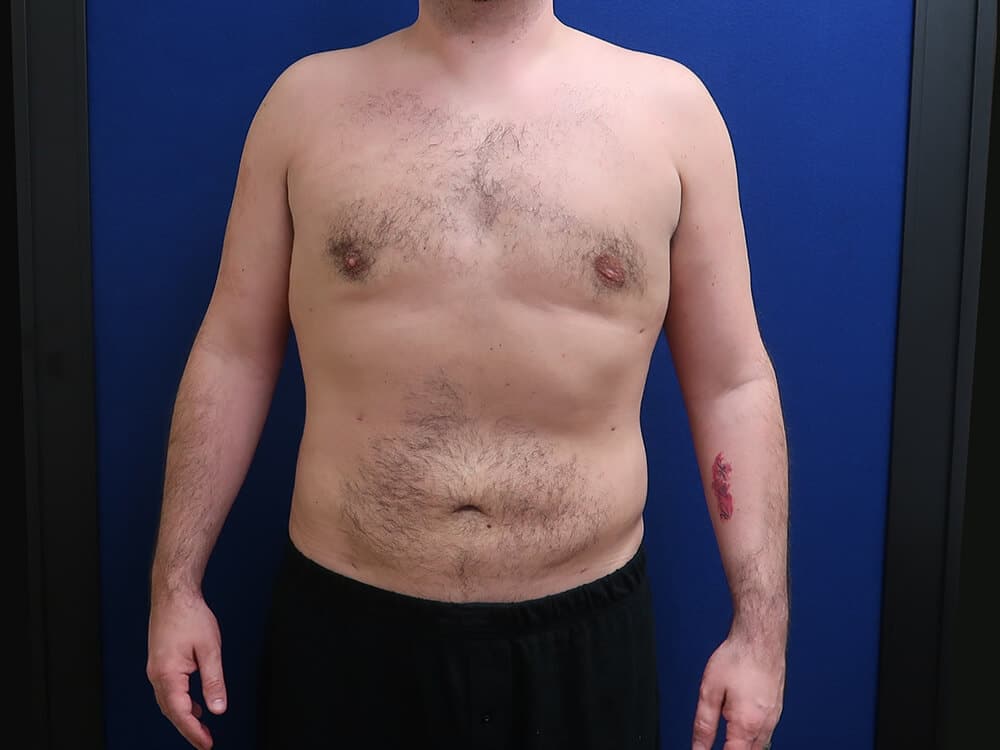Male Breast Reduction Surgery
Gynecomastia is a medical condition in which men develop excess breast tissue. Approximately 15 percent of adult men will develop some degree of gynecomastia in their lifetime. The appearance of male breasts can have a negative impact on a person’s self-esteem. Depending on the severity of your gynecomastia, methods such as diet and exercise may not restore a leaner chest appearance. Male breast reduction surgery is used to treat men with gynecomastia and pseudogynecomastia, restoring a more masculine chest contour.
How Can Surgery Help?
Male breast reduction surgery helps relieve men of the physical and emotional effects of gynecomastia. Dr. Wilson can design a male breast reduction plan that is tailored to meet your specific needs. In addition to removing unwanted tissue, Dr. Wilson focuses on restoring a defined and masculine appearance to the chest.
Liposuction
VASERlipo® is used in patients with pseudogynecomastia, where their enlarged breast appearance is created by deposits of fat around the nipple-areola complexes. VASERlipo® breaks up and removes unwanted fat, and Dr. Wilson is able to shape and contour the chest area for a natural appearance.
Excision
Excision is used to treat patients with glandular tissue or hard, dense tissue surrounding the nipples. To excise this unwanted tissue, an incision is created around the areola. While rare, some patients may require excess skin to be removed in addition to the overdeveloped glandular tissue.
Combination
Dr. Wilson most commonly combines liposuction and excision techniques to treat the exact causes of enlarged male breasts. Excision is used to remove glandular tissue, and liposuction removes residual fat from along the chest to refine the masculine contour.
Reasons for Enlarged Male Breasts
Disease/Hormone Imbalance
Medical conditions that affect hormone production can cause gynecomastia; tumors and certain cancers can cause excess glandular tissue to develop in men. It is important to see a medical professional to be diagnosed with gynecomastia. Some medications can cause male breasts, and treating the underlying medical issue causing your gynecomastia can ensure your health and that your male breasts don’t redevelop.
Age
The risk of developing gynecomastia, especially pseudogynecomastia, increases with age. Peak ages are usually between 50 and 69 years of age, with an estimated one in four men in this age range suffering from some form of gynecomastia. However, gynecomastia is commonly seen in young boys during puberty from a surge in testosterone. Most of these cases will resolve themselves naturally, but you should consult a doctor if yours lasts for more than two years.
Obesity
Being overweight has a number of negative side effects on your health. Obesity can cause hormone imbalances that lead to gynecomastia. However, in most obese patients, their enlarged breasts are due to fat accumulation in the chest. Diet and exercise may provide some improvement, but many men require reduction surgery to restore the attractive contours of their chest.
Drugs and Alcohol
Alcohol and drug use, especially marijuana and anabolic steroids, can lead breast development in men. If you are considering gynecomastia surgery, it is important that you quit using drugs and alcohol. Not only is it necessary for a healthy recovery, but continual abuse following your treatment can lead to a redevelopment of your male breasts.
Before & After Photos


34 year old had a male breast reduction with VASER liposuction as well as liposuction of the abdomen and flanks.
View Photo GalleryConcerns about Male Breast Reduction
Recovery
Patients will likely experience bruising and swelling of the chest. In some cases, a small tube is placed to drain fluid buildup. A compression garment is worn for six weeks to reduce swelling and to facilitate the healing process. You will need to limit your strenuous physical activities following treatment. Most patients can return to work after one week and resume their exercise routine within four weeks. Most major swelling should subside within six weeks, but your final results will not be seen until three months.
Pain
An anesthetic is provided during your male breast reduction surgery to eliminate pain. Patients may feel some mild discomfort for the first several days following their procedure. Oral pain medication can be used to treat any associated discomfort.
Scars
Male breast reduction uses thin, discreetly placed incisions around the chest to reduce scar development. However, depending on your body’s natural healing process, some mild scarring may develop, which is likely to fade over time.
Cost
The cost of male breast reduction surgery varies from patient to patient. The extent of correction needed plus surgical fees, facility fees, and anesthesia fees can all affect the ultimate cost of your surgery. A more detailed quote will be provided during your consultation.
Male Breast Reduction Frequently Asked Questions in Huntsville, AL
What type of anesthesia is used during surgery?
To ensure patient safety and comfort, most male breast reduction surgeries are performed with the patient under general anesthesia.
Are there any risks associated with male breast reduction?
As with any surgery, there are some risks involved with male breast reduction surgery. These are rare and include anesthesia risks, numbness, fluid accumulation, infection, swelling, and bruising. All of these will be further discussed with you during your initial consultation.
Am I a good candidate for male breast reduction?
Ideal candidates are in good health, do not smoke, and have realistic expectations of the procedure. Patients with good skin elasticity will experience the best results. However, if you do have skin laxity, Dr. Wilson may excise the excess tissue to restore a firmer contour.
What results can I expect with male breast reduction surgery?
The results of male breast reduction are generally long lasting. It is important to identify the cause of your gynecomastia and then undergo treatment. The use of certain medications, poor diet, or continual abuse of drugs can cause your gynecomastia to redevelop.


